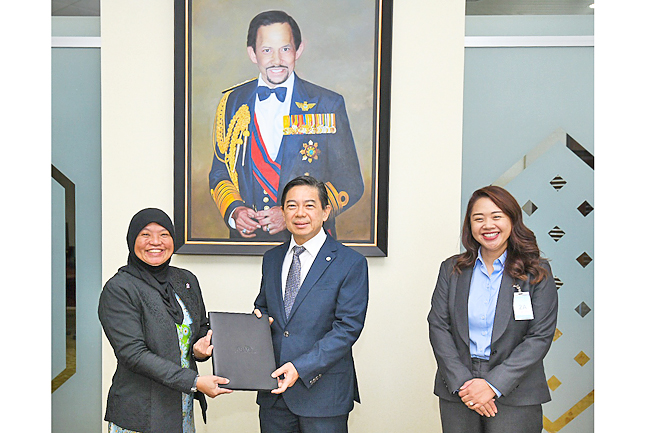Izah Azahari
Asia-Pacific Economic Cooperation (APEC) Business Advisory Council (ABAC) Brunei members, LVK Group of Companies Executive Director Nik Hafimi binti Abdul Haadii and imagine Sdn Bhd Chief Executive Officer Suzannawati binti Suharju presented the ABAC 2022 Report to Minister at the Prime Minister’s Office and Minister of Finance and Economy II Dato Seri Setia Dr Awang Haji Mohd Amin Liew bin Abdullah yesterday.
The report contains ABAC recommendations to APEC leaders to meet the unprecedented economic crises faced by the Asia-Pacific region arising from the consequences of the continuing pandemic, geo-political conflict, inflation, and supply chain disruptions which directly impact business, both large and small.
The recommendations will be the basis of discussions when ABAC Brunei members meet with APEC leaders during the November 18 annual ABAC dialogue in Bangkok.
The ABAC recommendations hope to speed up the region’s economic recovery, allowing for the regaining of momentum for dynamic, sustainable, inclusive, and resilient long-term growth.
Tackling inflation, food insecurity, restrictions on the movement of essential goods and services to tackle the pandemic, and re-opening borders safely to restore economic activity will be key to speeding recovery.

Regaining the momentum for long term growth will require actions to address the consequences of climate change, furthering regional economic integration by supporting the global rules-based trading system and accelerating the realisation of the Free Trade Area of the Asia-Pacific, enhancing support for micro, small and medium enterprises (MSMEs). It also includes women-owned and indigenous businesses – to foster inclusion, encouraging the faster and wider uptake of digital technologies, and pursuing fiscal consolidation and structural reform.
“Post pandemic APEC is not business as usual, nor is it – to a certain extent – about living a new normal. As APEC re-opens for business, this is also an opportunity to accelerate and transition many aspects of regional trade that can embrace innovation in the way APEC trades across borders; enable better platforms of collaboration between the public and private sectors and ensure the inclusion of the underserved and underrepresented; engage through digital innovation and sustainable development.
“Crucial to all of this is the underlying importance for economies to promote their MSMEs and enabling pivotal changes to the MSME support agenda can have a profound trickle-down effect and impact that allow them to survive and thrive,” said Nik Hafimi.
Suzannawati added, “The recommendations speak of the need for us to act together in ensuring we restore economic activities that promote a sustainable, dynamic, inclusive, and resilient long-term growth. What the pandemic has shown us is the importance of digital adoption across all businesses including MSMEs. We play a role in ensuring accessibility and inclusion for all to take advantage of this opportunity.”







